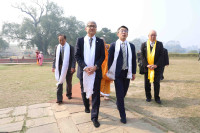National
Women praised for driving economic recovery post-Covid at ‘Nirvik Nari’
The fifth edition of the KMG’s key event highlighted women’s resilience in reviving Nepal’s economy and the ongoing struggle for leadership recognition.
Post Report
Women played a crucial role in reviving the national economy in the aftermath of the Covid-19 pandemic, said Lily Thapa, commissioner of the National Human Rights Commission, during the fifth edition of Nirvik Nari, organised by Nari, a publication of the Kantipur Media Group, on Wednesday.
Speaking at the session titled “Glass ceiling: Invisible barriers”, keynote speaker of the event, Thapa cited World Bank data, stating that nearly 45 percent of Nepal’s economy was sustained by small and micro-entrepreneurs—many of whom were women—between 2019 and 2021.
“Women lifted the economy through small businesses when everything else had come to a halt,” she said.
Other speakers echoed Thapa’s sentiments while shedding light on systemic barriers women continue to face.
Former minister and politician Ram Kumari Jhakri reflected on her personal journey, underscoring how her identity is shaped by how her elders and community see her.
She recounted her modest upbringing as a representative case of Nepal’s youth striving for change. She said that from walking barefoot during childhood in the remote village to playing the role of an active lawmaker in the federal parliament, she lived the transformation she advocates for.
Former Nepali Ambassador to Spain, Dawa Futi Sherpa, expressed concern over the societal pressures and dual roles women are forced to juggle. “The biggest obstacle to women’s progress is societal approval,” she said, emphasising the need to dismantle deep-rooted cultural expectations. “There are still unrealistic expectations that make women’s lives even more challenging.”
Rojina Raut, head of training and development at Devyani International, pointed out the lack of faith in women’s leadership. “Even female colleagues doubted me when I became a manager,” she said. “There’s an invisible barrier rooted in disbelief that women can lead.”
Raut also mentioned the scarcity of millennial female role models, which she believes has left Gen Z women uninspired to pursue leadership.
In a parallel discussion, advocate Roshani Poudyal criticised society’s unwillingness to accept women’s voices. “Whenever women speak against injustice, they’re the ones blamed,” she said.
Despite legal advancements, she argued, Nepali women still face invisible barriers while claiming their rights. “Our thoughts are not accepted in real life and that is reflected on social media as well,” she added, describing the persistence of a ‘blaming culture’.
Editor of Nari, Upasana Ghimire, explained that this year’s Nirvik Nari aimed to spotlight such invisible challenges. “Women in Nepal still face social and cultural discrimination,” she said. “This event tries to unpack the complexities of empowerment in today’s society.”
The second session, titled “The voices of teens”, came with impressive insights from four young students who discussed education, societal norms, and youth empowerment.

Silvia Sinjali Magar, a Grade 11 student at Kathmandu World School, voiced her ambition to pursue higher education abroad but ultimately return to Nepal to contribute locally. “Studying abroad can offer global exposure, but I want to build my future here,” she said, noting that technological access now makes international knowledge attainable from Nepal.
Skanda Swar, founder of Dhumbarahi Children’s Library and A-Level student at St Xavier’s, highlighted how inclusive environments from a young age reduce discrimination. “When children from all backgrounds read and play together, they grow up without bias,” she explained, sharing how her open library draws dozens of children weekly.
Afroja Nasim, a SEE graduate from Vishwaniketan School, criticised the current education system for prioritising rote learning over practical skills. “Certificates alone are not enough, we need real-world abilities,” she stated, citing examples of degree holders struggling to find internships.
Reeti Maharjan, a science student at United Academy and founder of a book club, described Nepal’s education system as outdated and rigid. She also questioned gender roles, AI’s impact on creativity, and the continued marginalisation of women.
In addition to addressing challenges, the event celebrated resilience and leadership, bringing together voices from politics, business, diplomacy, education, and youth. The multi-session programme continues to position Nirvik Nari as a key platform for advancing gender discourse in Nepal.




 19.12°C Kathmandu
19.12°C Kathmandu














